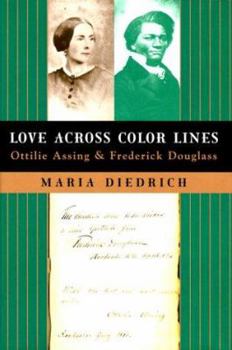Love Across Color Lines: Ottilie Assing and Frederick Douglass
Select Format
Select Condition 
Book Overview
In this nuanced, sympathetic interpretation of two extraordinary lives, Maria Diedrich acquaints us with an important and little-known relationship. Ottilie Assing, an intrepid German journalist, met... This description may be from another edition of this product.
Format:Hardcover
Language:English
ISBN:0809016133
ISBN13:9780809016136
Release Date:January 1999
Publisher:Hill & Wang
Length:480 Pages
Weight:1.15 lbs.
Dimensions:1.6" x 6.5" x 9.3"
Customer Reviews
2 ratings
Great Book!
Published by Thriftbooks.com User , 15 years ago
My daughter needed this book for class and the price was right!
Assing & Douglass: Radicalism Beyond Social Taboos
Published by Thriftbooks.com User , 25 years ago
A decade ago no one had heard of Ottilie Assing or had a clue that she played an important role not only in shaping European perceptions of the US in the crucial years up to and including the Civil War but in her role as collaborator and lover of Douglass for almost 30 years. Then, Terence Pickett, a scholar of German literature doing research in Poland, stumbled on a folder of letters that revealed an intimate acquaintance and passionate involvement between the German immigrant journalist and the American abolitionist. Pickett cautiously called it a friendship, but when William McFeeley used this information in his 1991 Douglass biography, he strongly suspected that the relationship went beyond friendship. Henry Louis Gates, Jr., choosing his words carefully, has meanwhile also concluded that for "much of Douglass's mature career, Assing was his principal intellectual consort." Maria Diedrich's "Love Across Color Lines" finally gives a detailed and thoroughly researched account of the life of this extraordinary woman, her background, commitment to radical causes, emigration in 1852, involvement in abolitionism, passionate attachment to Douglass, and her courageous but tragic end. It is an amazing story, deeply embedded in the stormy social and political conditions on both sides of the Atlantic. One consistent theme is that Assing's commitment to social revolution, having been frustrated by the botched events of 1848-49 in Germany, plays itself out in her support of radical abolitionism, which she consistently sees in terms of a second American Revolution. Another suggestive argument develops the continuity between Assing's partly Jewish background and her attitude toward slavery and race in the US. Though Assing often expressed typical 19th-century racial attitudes, her experience of belonging to a despised minority in Germany helped her to espouse the cause of black Americans, sometimes with more radical passion than Douglass himself. Most original and interesting, moreover, is Diedrich's carefully argued idea that Assing's imagination was infused with the romanticized representation of a black African prince and a white European woman in a novel by one of her close German friends, who based it on Aphra Behn's "Oroonoko." With all of Assing's emphasis on rational social analysis, much of her relationship with Douglass must be explained in terms of the kind of romantic orientalism that shaped her imagination. As Diedrich makes clear in her narrative, the essential problem of writing this biography was the one-sidedness of the evidence. Assing destroyed all letters (hundreds of them) from Douglass; he destroyed all but 27 from her to him, and he mentions her only in passing in his third autobiography. The story that emerges is largely based on Ottilie's letters to her sister and friends, on her published journalism, and on a handful of manuscripts. But the circumstantial evidence--that Douglass and Assing c





